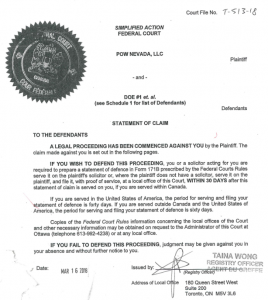Team Members ()
Insights ()
News ()
Pages ()
Services ()
Online File Sharing Mass Lawsuits
Hollywood production studios are suing hundreds of everyday people in Canada, accusing them of illegally sharing and downloading their copyrighted content from the Internet. If you receive a Statement of Claim like the one below by registered mail, you are being sued: act quickly or risk a judgement and monetary award against you.
Using a novel legal procedure, Hollywood studios are consolidating what would otherwise be hundreds of lawsuits into just a handful of lawsuits. These lawsuits usually follow a set process. The studio identifies people sharing or downloading movies online, usually using BitTorrent. Next, it sends each of these people a notice through their internet service provider (ISP) that asserts the person’s activity infringes the studio’s copyright in the movie under the Copyright Act, and demands they stop. If the studio later identifies one of these people downloading or sharing the same movie, it will consider them to be a target for their litigation. The studio then starts a single lawsuit against these alleged downloaders, calling each of them a “John Doe” because it doesn’t know their names yet. In some cases, there are hundreds of John Doe defendants in a single suit. Finally, the studio applies to the Federal Court of Canada to order the ISP to identify the customer account-holder from the IP address associated with the activity. With this customer name and address, the studio then serves that customer with a Statement of Claim for violating the Copyright Act.
Many people are now receiving a Statement of Claim from the Federal Court of Canada identifying them as one of the “John Does” in their lawsuit. This is different from the notice you might have received from your Internet Service Provider. If you receive a Statement of Claim, you are being sued and you are a defendant in an actual lawsuit. You cannot ignore this. You have only 30 days to both file a Statement of Defence and serve it on the studio. If you don’t, the studio can ask the Federal Court to grant it default judgement, including an award of monetary damages, against you that it can enforce against you and your assets – without giving you any chance to represent yourself in Court. Statutory damages for non-commercial infringement can be up to $5,000.
How can McInnes Cooper help?
If you receive such a Statement of Claim, seek legal counsel. McInnes Cooper represents a number of defendants in these lawsuits, working with clients to settle them or to dispute the alleged copyright infringement. The availability of electronic filing, our familiarity with the law firms initiating these lawsuits, and our relatively low cost of legal services in Atlantic Canada puts McInnes Cooper in a unique position to help Canadians across the country defend themselves against these copyright infringement class action lawsuits. For more information on our services please contact Patrick Kerr, Parker Menzies or Tom Keeler.
We are currently aware that these production studios have started reverse class action lawsuits:
- Outpost Productions, Inc.
- Eve Nevada, LLC
- Venice PI, LLC
- Morgan Creek Productions, Inc.
- Dallas Buyers Club, LLC
- Justice Everywhere Productions, LLC
- Criminal Productions
- Bodyguard Productions, Inc.
- ME2 Productions, Inc.
- UN4 Productions, Inc.
- LHF Productions, Inc.
- WWE Studio Finance Corp.
- Voltage Pictures Et. Al
- Headhunter, LLC
- Cell Film Holdings, LLC
- Wind River Productions, LLC
- POW Nevada, LLC
- Hybrid, LLC
- Fallen Productions, Inc.
- Rambo V Productions, Inc.
- HB Productions, Inc.
- Hunter Killer Productions, Inc.
- TBV Productions, LLC
- Hitman Two Productions Inc.
Related Lawyers
View All Related LawyersRelated Content
-
David Fraser on CBC Mainstreet | Copyright Infringement Reverse Class Action Lawsuits
Apr 18, 2019
Online file sharing could have more serious consequences for internet users than they thought. Hundreds of everyday Canadians are receiving a…
News -
Protect Your Assets: An Intellectual Property (IP) Primer
Oct 19, 2016
Updated January 17, 2023. For many businesses, large and small, their “Intellectual Property” (IP) is one of their most valuable assets.…
Publication
Stay Updated
Subscribe to McInnes Cooper to stay current with our leading insights on legal updates, trends, news, events, and services.
- 1.866.439.6246
- Privacy Policy
- Copyright © 2025 — McInnes Cooper









